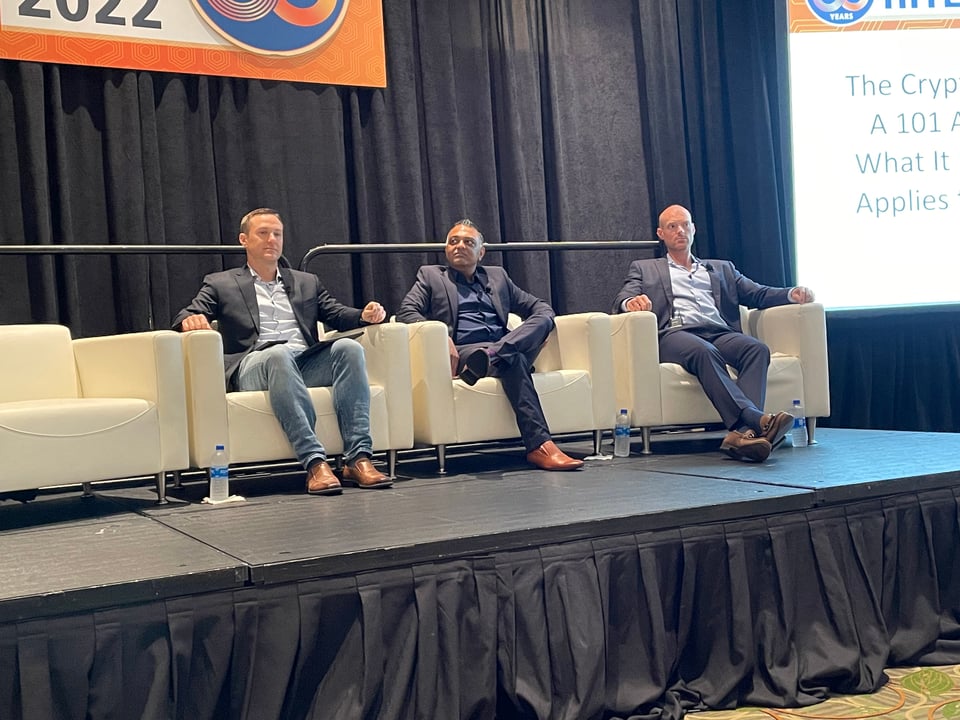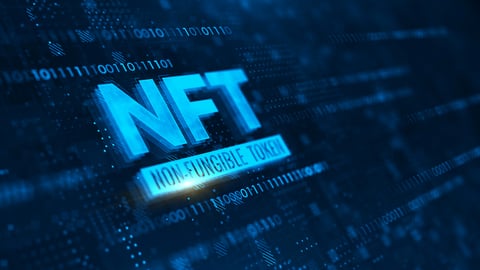HITEC 2022: Current Crypto Winter Is Actually a Good Thing
During HITEC 2022, June 27th’s opening day panel on "the crypto / NFT hotel" was packed with attendees who were interested in learning more about what the future holds for the hospitality industry. Like many in the audience, I appreciated that Adam Mogelonsky, partner, Hotel Mogel Consulting Ltd., began the session by first defining the term Non-fungible Token (NFT) for attendees.
“Fungible means interchangeable, so when something is non-fungible, it’s a unique thing. The token aspect of this term refers to a piece of code that provides a gate so that only a few users, or just one, can access whatever is behind it,” he explained.
For example, NFTs allow artists, musicians and other content creators to produce their work and create proof of ownership with a highly visible means of traceability, notes Lyle Worthington, CHTP, CEO, Worthington Tech. And if someone else wants to use it, they need to pay a licensing fee.
This proof of ownership is stored via a blockchain – a public decentralized ledger – where information is repeated across servers around the world. This is meant to ensure that the information can’t be changed or attacked – making it non-fungible, Mogelonsky adds.
But can this blockchain network be trusted?
Ken Patel, founder and CEO of EV Hotel, believes it can. “I truly believe having a decentralized blockchain prevents fraud.”
How? According to Worthington, every transaction made on the blockchain is completely visible to all of its users. If at least 51 percent of the blockchain nodes (network stakeholders and their devices that are authorized to keep track of the distributed ledger) on the network agree that a transaction is legitimate – it’s allowed to proceed.
Of course, there have been some hiccups along the road to trust. For example, a few years ago an Ethereum user found a way to “mint” unauthorized coins. And there was also a very real concern that China would take over the Bitcoin nodes. But overall, this entire operational process seems to be making steady progress.
NFT Use in Hospitality
So, what does all of this mean for the hospitality industry?
NFTs have begun to evolve. They now don’t just grant ownership rights to an image or piece of music. Now they can grant purchasers access to a wide variety of things, from entrance to an exclusive club to first-rights on an event ticket, hotel room stays, entrance to a space within the metaverse, or even a breakfast voucher, Mogelonsky noted.
“Your NFT has to have utility,” added Patel. “You need to think about its value and how it can become a revenue stream.”
For Mogelonsky, the most valuable utility NFTs can provide is convenience.
“The most valuable thing we have in this world is our time,” he notes. “So how can your NFT save people time while interacting with your hotel brand?”
First and foremost, look to your loyalty program.
EV Hotel is one brand that already has implemented an NFT loyalty program. Guests purchase an NFT at various levels which then guarantee certain perks and rewards that can be used instantly, instead of having to accumulate points with the brand over time.
For example, the brand offers NFTs that cost anywhere from $6k to $40k. Depending on the type of NFT purchased, guests receive perks such as free drinks, appetizers, spa services, first class plane tickets, and with its top tier NFT – 54 room nights for free that never expire and can be used at any time.
Why is the brand so bullish on this concept?
“It provides the guest with a large amount of value and also guarantees 50 percent occupancy for the entire year,” Patel explains.
Of course, this doesn’t mean that a hotel brand would stop offering their traditional loyalty program overnight and make the switch to one based on NFTs.
“Offer both types of loyalty programs, test the waters, and iron out the kinks,” Mogelonsky said. “For example, you need to learn about smart contracts, decide which coin to tie your program to, research insurance policies to have in place in case there is a catastrophic collapse of the currency, etc.”
Are NFTs Just a Fad?
In the 90s, the internet was a shiny new toy and now it’s an integral part of life, notes Mogelonsky. Blockchain technologies are headed in that same direction. Even though it is currently a crypto winter, the technology is here, evolving and gaining momentum.
Many naysayers might point to the recent “bust” that dropped Bitcoin’s worth from approximately $64k in November 2021 to approximately $20k as of July 11, 2022. But according to Patel, most cryptocurrency holders expected the market to bust at some point.
And Mogelonsky believes the recent bust is helping to wipe out any “Ponzi” schemes currently happening.
“Keep in mind that this NFT boom might not have happened if we didn’t have the COVID-19 pandemic,” he adds. “There were a lot of people with some extra cash on hand, locked up and bored. So they invested in crypto currencies. It’s still a bit of the Wild West out here but it’s also pushed the technology ahead even faster. Now that we’ve gotten through the bubble of stupidity, we can start to really look at how it can benefit our businesses.”
“This technology is important,” agreed Worthington. “It’s as important as any other technology conversation. We don’t have the answers at the moment, but we know the world is trending towards this and we don’t want to be left behind.”
Want to learn more about what is happening with NFTs and cryptocurrencies. Bookmark these links and check back regularly to stay informed!




